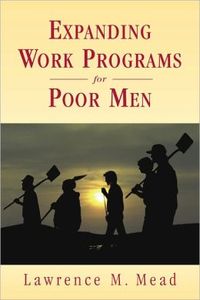

Purchase
Expanding Work Programs For Poor Men
Lawrence M. Mead
AEI Press
May 2011
On Sale: May 16, 2011
155 pages
ISBN: 0844743976
EAN: 9780844743974
Kindle: B005XN7LUG
Hardcover / e-Book
Add to Wish List
Non-Fiction
Welfare reform, which required that poor mothers work in
return for assistance, was a watershed in the struggle
against poverty for American families. As work levels rose
dramatically among low-income women, the welfare rolls were
cut in half and many families rose out of poverty. But men's
employment is also crucial to uplifting families, and
programs designed to encourage work among poor men are often
poorly funded and little understood by policymakers. Expanding Work Programs for Poor Men makes the case
that poor fathers, like poor mothers, need "both help and
hassle." That is, poor men need more help from the
government, but they must also be expected-and required-to
help themselves. Drawing on welfare reform as a successful
precedent, Lawrence M. Mead explores the psychology of male
nonwork and evaluates the successes and failures of existing
government programs for poor men, including child support
and conditions of parole. These programs have succeeded in
increasing work levels among poor men by requiring that they
provide income to support their families or maintain a job
to avoid returning to prison. Although both programs rely on
legal enforcement, they are most effective when enforcement
is coupled with incentives. Mead suggests that child support
and parole conditions offer a useful model for future men's
work programs, which should be mandatory and enforced, but
combined with rewards for steady work, such as higher wage
subsidies for low-income workers. Requiring poor men to work is as vital as welfare reform in
ameliorating family poverty. This groundbreaking volume maps
a way forward in making steady work the norm among poor men
in America.
Comments
No comments posted.
Registered users may leave comments.
Log in or register now!
| 


 © 2003-2024 off-the-edge.net
all rights reserved Privacy Policy
© 2003-2024 off-the-edge.net
all rights reserved Privacy Policy